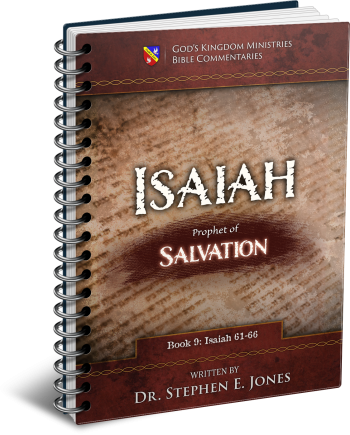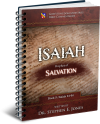Latest Posts
View the latest posts in an easy-to-read list format, with filtering options.

Isaiah is the prophet of Salvation. He is also known as the truly "Universalist" prophet, by which is meant that He makes it clear that salvation is extended equally to all nations and not just to Israel. He lived to see the fall of Israel and the deportation of the Israelites to Assyria, and he prophesied of their "return" to God (through repentance). He is truly a "major prophet" whose prophecies greatly influenced the Apostle Paul in the New Testament.
Category - Bible Commentaries

Isaiah 62:3 says,
3 You will also be a crown [atarah, “crown, wreath”] of beauty in the hand of the Lord, and a royal diadem [tsaniph, “turban”] in the hand of your God.
This is another short Hebrew couplet that states and restates the same thing in different ways. The “crown of beauty” is parallel to the “royal diadem,” while “the Lord” is also “your God.”
The “crown” is a bridal wreath, while a “diadem” is a turban. The word tsaniph is derived from the word tsanaph, “to wrap or wind together.” Together, they represent what a man and a woman may wear at their wedding. Both are “in the hand” of God, which is to say that these are in God’s control and direction. He is the One giving them to the Bride and Groom.
Isaiah 62:4 says,
4 It will no longer be said to you, “Forsaken” [Azubah], nor to your land will it any longer be said, “Desolate” [Shemamah]; but you will be called, “My delight is in her” [Hephzibah], and your land will be married [Beulah].
This appears to be the prophet’s explanation of “a new name” (Isaiah 62:2) for the bride. Jeremiah’s revelation of the new name, Yahweh-Tsidkenu, is the name given to the Groom, for Christ is our righteousness. Together, the prophets jointly paint a prophetic picture of the Groom being given the new name, Yahweh-Tsidkenu, as He is given the turban, while the bride is given the name Hephzibah while she is given the bridal wreath.
Perhaps the prophets are suggesting that the wreath on the bride’s forehead actually represents the new name on her forehead. In Deut. 11:18 Moses instructed the people in a metaphorical way to bind the word of God on their forehead, saying,
16 You shall therefore impress these words of mine on your heart and on your soul; and you shall bind them as a sign on your hand, and they shall be as frontals on your forehead.
This signified the word being written “on your heart and on your soul.” In other words, God’s intent from the beginning was to implement the New Covenant, “I will put My laws into their minds, and I will write them on their hearts” (Heb. 8:10). Hence, when God has written His law on the heart and mind of the bride of Christ, she will receive (metaphorically) the “crown,” or bridal wreath, on her forehead.
John says in Rev. 22:4, “His name will be on their foreheads.” The “crown” in Isaiah, which is linked to “a new name,” is interpreted by John as “His name.” A name is an identifier. Whereas the bride used to be called Azubah (“Forsaken”), the promise of God is that she will receive the new name, Hephzibah (“My delight is in her”).
In this context, it is interesting to see that the Groom also receives a new name, represented by the turban. Christ is the Groom, and He was given the name Yeshua (or Jesus) in His first coming. Yet it was prophesied in Isaiah 7:14 and again at His conception in Matt. 1:23 that He would be called Immanuel, “God with us.”
So we read in Rev. 21:3 that in the time of the New Jerusalem and the Christ’s second coming,
3 … Behold, the tabernacle of God is among men, and He will dwell among them, and they shall be His people, and God Himself will be among [meta, “with, among”] them.
By setting up His tent, tabernacle, or dwelling place among us here on earth, He becomes Immanuel to us.
The purpose of creation was to create a paradise on earth that would reflect the glory of heaven. That was lost through Adam’s sin but restored through Christ’s righteous act on the cross. As a result, the original purpose for creation will be fulfilled, for God cannot fail. John saw this in his vision of “the holy city, New Jerusalem, coming down out of heaven from God, made ready as a bride” (Rev. 21:2).
This is the salvation and sanctification of the physical earth—all that was created by God at the beginning. This is the hope of creation (Rom. 8:20, 21). The manifestation, or “revealing,” of the sons of God is proof that the promise of God to all creation will indeed be fulfilled.
Isaiah thus tells us that the “land” (erets, “land, earth”) will be “married,” being given the new name, Beulah. This will be the spiritual name of the earth when creation is reconciled and sanctified and when God is “all in all” (1 Cor. 15:28).
Scripture pictures this as a great marriage between heaven and earth. Some have misunderstood God’s purpose and have concluded that Heaven would divorce the earth and cast it away—as if it had no further value to God. But the prophets and apostles give hope (i.e., “expectation”) that God will succeed in His plan to create a double witness, a bride, who will reflect His glory and His nature.
New Covenant faith is believing that God can and will fulfill His promise, not only to the few but to all nations and the creation as a whole. The few have been called as ambassadors of this “word of reconciliation” (2 Cor. 5:19). Abraham’s children are thus called to bless the world. The promise to Abraham is to call the few to bless the many. Likewise, the first fruits sanctify the harvest. The few are called and saved today to be the first fruits of creation.
Isaiah 62:5 concludes,
5 For as a young man marries a virgin, so your sons will marry you; and as the bridegroom rejoices over the bride, so your God will rejoice over you.
In this couplet the “young man” is restated as “your sons,” and “a virgin” is restated as “you.” Hence, the “bridegroom” is pictured on two levels. Christ the Son is the overall bridegroom, but “your sons” are the sons of God, the entire body of Christ. These sons are the collective children of “Sarah,” the New Jerusalem, for they are the true inheritors. Though the children of Hagar-Jerusalem have laid claim to the inheritance, Paul says that they are the children of the bondwoman and must be “cast out” in the final court case that determines who is and who is not the rightful inheritor of the Kingdom.
The children of the bondwoman will be set free from their bondage at the Creation Jubilee, but they will not be given the highest honor of ruling the Kingdom. The sons of God must be recognized as the first fruits of creation so that they may enter their calling unrestricted to bless all nations.
In the end, Isaiah says, these “sons” will “marry” the land, or earth. The Son of God does not intend to do His work alone. In His first coming, He faced the cross alone; but in His second coming, He works through His people, the sons of God, who, like Him, were begotten by God. He is thus the Head of a body—distinct, yet one body.
The second coming of Christ sees the manifestation of the sons of God. This is when the overcomers of past ages are raised in the first resurrection (feast of Trumpets), and those who are alive at that time are “changed” (first day of Tabernacles). Together they form one perfected body, so that the Head may come and join that body in the middle of the feast of Tabernacles in order to be complete.
Then the entire body, including the Head, will be presented to the Father on the eighth day of Tabernacles, so that they may then be presented, or “manifested” to the world. Paul wrote about His second coming in 2 Thess. 1:10, saying,
10 when He comes to be glorified in His saints on that day, and to be marveled at among all who have believed…
Hence, His coming as the Head of the body is “to be glorified in His saints.” The world will see the glory of God in the saints and will marvel at the brightness of their light, for “the Lord will rise upon you, and His glory will appear upon you” (Isaiah 60:2).
In fact, they will want to know how they too can receive that glory, and so “nations will come to your light” (Isaiah 60:3). Further, they will “go up to the mountain of the Lord… that He may teach us concerning His ways and that we may walk in His paths” (Isaiah 2:3).
So even though the vast majority of humanity will miss the greatest glory of the first resurrection, the manifestation of the sons of God will give them hope for the future in the general resurrection at the end of the thousand years. Then, when all the dead are raised to life, and every knee bows to Christ, the rest of humanity since the beginning of time, having been converted to Christ at the Great White Throne, will have hope. They will understand that their judgment is long but temporary (aionian). They will know that the Creation Jubilee will ultimately set them free and bring them the same glory and liberty that the sons of God had received earlier.
That great Jubilee will set all creation free, and then the sons of God will marry the whole land/earth. But that marriage cannot take place until the bride and groom can be equally yoked. To do that, they must both be perfected and glorified. Hence, the word of Isaiah saying, “your sons will marry you,” cannot be fulfilled apart from the restoration of all things.